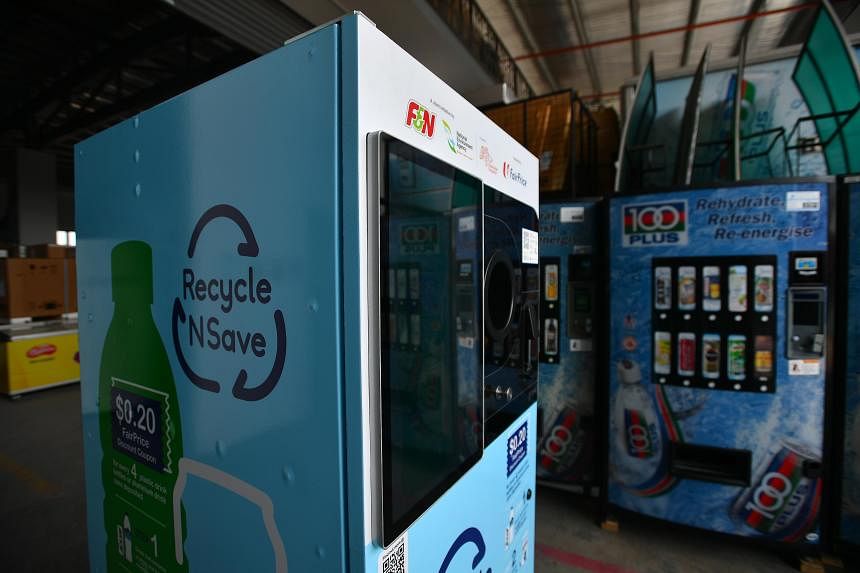SINGAPORE – A reward-based scheme using reverse vending machines (RVMs) to collect empty plastic and aluminium beverage containers has stopped giving out rewards since July 31.
This is in preparation for the launch of the Beverage Container Return Scheme (BCRS), according to the Recycle N Save website. Rolled out in October 2019, Recycle N Save is a joint initiative by the National Environment Agency (NEA) and F&N Foods.
From April 2025, when the new scheme starts, a refundable deposit of 10 cents will be applied to all pre-packaged drinks in plastic bottles and metal cans ranging from 150ml to 3 litres.
The deposit will be refunded when the empty container is returned at designated return points.
All beverage containers covered under the scheme will display a deposit mark and barcode. The deposit mark helps consumers identify eligible products, while the barcode facilitates the return of the containers and serves as an anti-fraud measure.
Observers see the RVM playing an important role in the success of the BCRS.
Professor Seeram Ramakrishna, a board member of the Plastic Recycling Association Singapore, explained that 40 per cent to 80 per cent of beverage containers sold in countries that have implemented a deposit-refund scheme, which is similar to BCRS, are returned.
The machines can also play a part in encouraging consumer recycling behaviour.
Economist at Research For Impact Loh Wei Kok pointed out that when the scheme starts in 2025, people would at least be familiar with the machines compared with other processes that have yet to be introduced.
“The reverse vending machines will need to be situated at accessible locations, and their maintenance or capacity would need to be stepped up in view of potentially higher usage.”
Inconvenience was the main push for Ms Stella Soon to resume recycling her beverage containers in the blue recycling bins instead of the RVMs.
The 48-year-old, who stopped using the machines three years ago, found it a hassle. “There was also an issue with the machine not being able to identify certain cans or bottles.
“The final straw was when the number of cans/bottles required to get the reward was increased. It was then not worth the effort to take the cans and bottles to the machine to recycle, queue up and get a small reward.”
Regardless of reward, Mr Tan Hang Chong, 49, has been depositing his empty drink containers into the RVM located at Woodlands Stadium.
“I avoid using the commingled blue bin due to the risk of contamination,” he said.
Under the National Recycling Programme, blue recycling bins are placed in residential estates to collect mixed recyclables from domestic waste.
However, with contamination rate at 40 per cent due to food, liquids and other items being misplaced in the blue bins, dirtied recyclables are sent to the incineration plant instead of being recycled.
Observers noted that the RVMs are a good start to encourage the recycling habit in Singapore.
Ms Pek Hai Lin, senior manager of sustainability (estates) at the Singapore Institute of Technology and former executive director of Zero Waste SG, said it is heartening to know that people are willing to sort, keep and take containers to RVMs even though the extra effort “may outweigh certain incentives provided”.
“This shows that perhaps the public is willing to recycle if they can trust that the system set-up minimises contamination and maximises (the) chances of materials actually being recycled after they are collected.”
The return scheme was launched on Oct 31, 2019, and dispensed rewards such as one 20-cent FairPrice voucher for every four empty beverage containers deposited.
A wider array of rewards, including ActiveSG credits and Sentosa Fun Pass tokens, and a “no rewards” option were added from June 30, 2020.
In response to queries from The Straits Times, F&N Foods and NEA said in a joint statement: “The take-up of the ‘no rewards’ option was encouraging.
“We are heartened that many users have developed a habit of recycling beverage containers at RVMs through Recycle N Save.”
More facilities in S’pore to reprocess paper, textiles could boost recycling rate: Industry insiders
Students create app that lets users scan barcodes on packaging to see how items can be recycled
Recyclables can still be deposited in the 50 machines located throughout the island.
Since the pilot was launched on Oct 31, 2019, 16 million beverage containers have been collected.
In Singapore, it is estimated that more than one billion pre-packaged beverages are supplied to the market yearly.
“Sixteen million is small when compared with a billion. However, given that it is a pilot scheme, I would consider it encouraging and believe that it provides opportunities for learning and designing better waste collection and management systems,” said Prof Seeram.
They could include a local plastic recycling plant for plastic bottles. Plastic waste from domestic sources have mostly been exported overseas for further recycling.
Mr Loh said: “The numbers are not meaningful until the waste loop is closed. This means developing recycling capabilities locally, as some countries have banned the import of recyclables.”
Domestic recycling rate in Singapore in 2022 lowest in more than a decade
Households can collect free home recycling boxes from vending machines
Join ST’s WhatsApp Channel and get the latest news and must-reads.
p.st_telegram_boilerplate:before {
display: inline-block;
content: ” “;
border-radius: 6px;
height: 6px;
width: 6px;
background-color: #12239a;
margin-left: 0px;
margin-right: 13px;
}
a.st_boilerplate {
font-family: “SelaneWebSTForty”, Georgia, “Times New Roman”, Times, serif;
}


